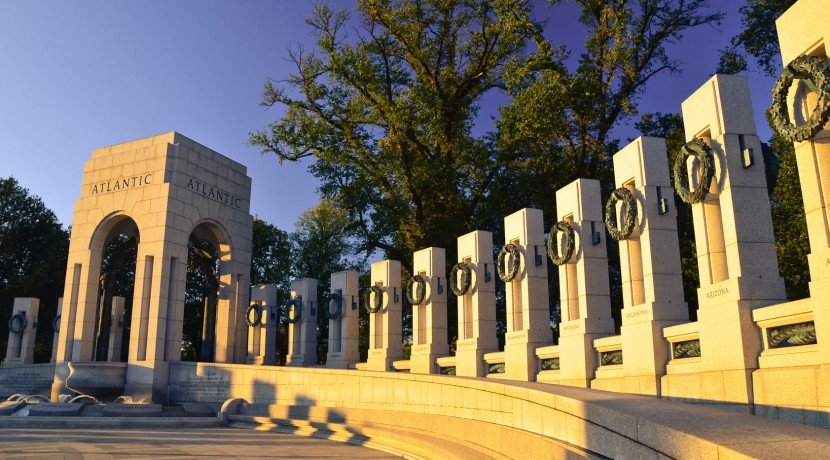On the Hill: House Tries to Add Religious Plaque to War Memorial
With election season rapidly approaching and substantive work on important topics like immigration reform and climate change all but nonexistent, some members of Congress have decided to waste even more time by pushing forth a divisive bill that seeks to further alienate nonreligious Americans from historic national war memorials.

The National World War II Memorial in Washington, DC. Photo by surangaw / 123RF
This week the Public Lands and Environmental Regulation subcommittee in the U.S. House of Representatives held a hearing on H.R. 2175, also known as the World War II Memorial Prayer Act of 2013, which would install a plaque at the World War II monument in Washington D.C. “with the words that President Franklin D. Roosevelt prayed with the United States on June 6, 1944, the morning of D-Day.”
This bill, which has yet to achieve bi-partisan support, passed the House of Representatives in 2012, but failing passage in the Senate that year the bill has recently been reintroduced in both the House and Senate.
The American Humanist Association has for years worked to oppose religious monuments on public grounds, including opposing in court a Christian cross which rests on public land in California that was meant to honor war veterans. Our reason for opposing these religious monuments is the same basis for our opposition to this new legislation: such monuments are a violation of the separation between church and state, and adding a religious element to monuments meant to honor war veterans serves only to alienate nonreligious soldiers—and soldiers who are not of the same faith—mentioned in the prayers.
President Franklin Delano Roosevelt’s prayer is just as divisive as any we have ever seen; he stated, “Our sons, pride of our Nation, this day have set upon a mighty endeavor, a struggle to preserve our Republic, our religion….” Nonreligious soldiers who served in World War II certainly were not doing so in order to preserve “our religion” and claims to the contrary can only be viewed as disrespectful of their memory and sacrifices.
While these bills are not guaranteed to pass, humanists should still be concerned; they carry a powerful political message and may be successfully ushered through Congress in order to garner popularity for its supporters before the election later this year. It’s worth noting that the Senate version of the bill has already cleared the committee stage, and the House version is likely to pass as it has in previous years.
Hopefully, Congress will recognize that there are many more productive things it should be doing with its time, from issues like funding scientific research or supporting LGBT rights, and will let the bills die like they have in previous years. Doing so would take no effort on their part, and would honor nonreligious soldiers, both past and present, who wish only to serve their country honorably.Tags: National World War II Memorial, US Congress
